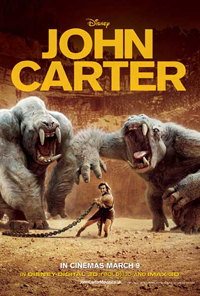 It takes a studio known for its animation and a director who began as an animator to create a film as visually synthetic as Disney’s John Carter, but it’s not the computer generated landscapes and characters that do it in. The misuse of the source material and a weak leading man take care of that.
It takes a studio known for its animation and a director who began as an animator to create a film as visually synthetic as Disney’s John Carter, but it’s not the computer generated landscapes and characters that do it in. The misuse of the source material and a weak leading man take care of that.
Adapted from Edgar Rice Burroughs’ 1912 pulp magazine serial Under the Moons of Mars, John Carter is the story of former Confederate Army Captain and titular character, John Carter (Taylor Kitsch).
After the war, Carter becomes a prospector searching for gold in the American Southwest. He has lost his family and his cause and now he is simply after material wealth.
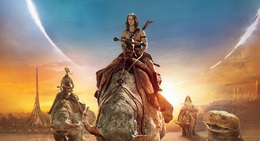 Carter discovers a mysterious cave filled with gold and a knife wielding bald man, whose amulet transports Carter, via a bodily projection, to Barsoom, which we Earthlings know as Mars.
Carter discovers a mysterious cave filled with gold and a knife wielding bald man, whose amulet transports Carter, via a bodily projection, to Barsoom, which we Earthlings know as Mars.
On Mars, Carter’s surly mercenary nature and the planet’s limited gravity give him the strength to rise within the ranks of the Martian natives, and quickly become a force to be reckoned with.
The effects of the Martian gravity on our protagonist reveal one of the running flaws throughout the lengthy John Carter. Things are always just a little too easy for our main character, and plot points line up like stepping stones as he too conveniently finds key information just before he needs it to overcome whatever small obstacle will face him next.
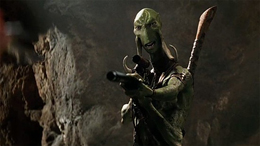 Carter’s amplified Martian strength allows him to dispatch an entire army in one scene, but even before that, Carter’s frustration over his inability to understand the Martian tongue spoken by the 9-foot-tall Tharks is only short-lived. When his Thark caretaker, Sola (Samantha Morton), gives Carter a magic potion all words are miraculously translated. Problems melt away like icicles in the desert of Mars.
Carter’s amplified Martian strength allows him to dispatch an entire army in one scene, but even before that, Carter’s frustration over his inability to understand the Martian tongue spoken by the 9-foot-tall Tharks is only short-lived. When his Thark caretaker, Sola (Samantha Morton), gives Carter a magic potion all words are miraculously translated. Problems melt away like icicles in the desert of Mars.
Of course John Carter is an adventure story and such plot-driven narrative is unfortunately expected. Had the film come through on all other counts, a plot that reads like driving directions could be forgiven, but Kitsch, true to his name, holds only fleeting interest and lacks the substantive qualities necessary to command our attention and lead the film.
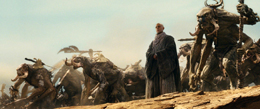 Carter in Kitsch’s hands was easily the least interesting character, and I found myself wishing that writer/director Andrew Stanton (WALL-E, Finding Nemo) had focused on the far more fascinating Dejah Thoris (Lynn Collins). Thoris could have easily been our main character, but instead this warrior princess fights when the scene calls for it only to become emotionally weak the next scene — whatever Carter’s motivation demands.
Carter in Kitsch’s hands was easily the least interesting character, and I found myself wishing that writer/director Andrew Stanton (WALL-E, Finding Nemo) had focused on the far more fascinating Dejah Thoris (Lynn Collins). Thoris could have easily been our main character, but instead this warrior princess fights when the scene calls for it only to become emotionally weak the next scene — whatever Carter’s motivation demands.
Here we can discuss the double-edged nature of John Carter’s source material. Written in 1912, Burroughs’ story feels at times quaint or out of date. When the storytelling devices of Burroughs are employed, including the narrative bookends of young Edgar Rice Burroughs, as a character, discovering his Uncle Carter’s journal, the effect is charming.
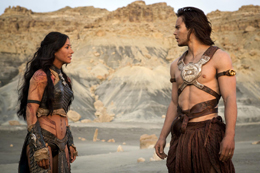 But the sentiments of 1912 are now 100 years in the past and the colonial nature of the narrative – a white American outsider comes to a desert land filled with red-skinned indigenous peoples and quickly becomes their ruler because otherwise the indigenous would kill themselves with civil war – is at best troubling given the United States’ contemporary geopolitical situation.
But the sentiments of 1912 are now 100 years in the past and the colonial nature of the narrative – a white American outsider comes to a desert land filled with red-skinned indigenous peoples and quickly becomes their ruler because otherwise the indigenous would kill themselves with civil war – is at best troubling given the United States’ contemporary geopolitical situation.
Much like the misguided nature of Pixar’s Cars, which focused on the love of the open road and adorable fossil fuel consuming main characters while we were in the midst of a global gas crisis and record high fuel prices, John Carter seems absurdly blind to the contemporary world of its theatrical release.
It might work as escapist fantasy or visually pleasing space opera, but unless Dejah Thoris is at the helm, leading her own Martian followers, it is an escape that holds no interest for me.
For another (far more forgiving) take, check out Scene-Stealers Editor-in-Chief Eric Melin’s review of John Carter.







{ 4 comments }
Trey, you miss the point of this movie. It is a celebration of the original source material. Not a re-imagining. Dejah as the main character? Bleh. This isn’t Underworld. This is about John. John wasn’t eloquent. He wasn’t ‘Ahnold’ action-hero tossing off one-liners. To take him and turn him into a modern action hero just to pander to the lowest common denominator would have been sickening. To change the focus of the movie to make movie reviewers happy would be just as much so. These books have over a century of fans. Sales that continue to this day. They have affected and shaped a whole genre of literature. For once the ‘we are greater geniuses than ANYONE’ Hollywood crowd put down their drug-induced self delusions of grandeur and brought a classic to life without violating it out of hubris.
Knight Arront,
You make a really solid case for the cultural importance of the book. I know that its affect on literature and films has been widespread, but you stop short from talking about why the film or the book was affective. What I mean by that is how and why is it able to stir emotions in you? I can’t respond to what you felt, that is a point of fact. We can explore what the film did, if anything, to make you feel the way you felt.
Any motion picture adaptation will be both a celebration and a re-imagining. The very nature of the different mediums, film and literature, and the process that pushes a story from one to the other calls for artists to make specific choices about how to tell a story with images and sound instead of words on a page.
My point in suggesting that Dejah should have been the main character was that hers was the most compelling struggle of all of the characters and Lynn Collins easily gave the best performance in the film. Not all films with female protagonists are as insubstantial as Underworld, and it would have been entirely possible to rework the script and film to focus on Dejah and give viewers a compelling story. It would have taken more liberties with the Burroughs’ story, and that would have chafed the purists to be sure.
Perhaps it was a matter of compression from book to film, maybe John Carter makes a more compelling literary protagonist than a screen hero, perhaps it was Kitsch’s performance, but John Carter was overlong and devoid of real struggle or drama. Never once did I question the outcome of the story or feel that any of our main characters were in any actual or imagined danger, which is a shame since I do appreciate a good adventure tale.
To give an example that cuts significantly closer to the grain than Underworld or anything the Governator’s been in, John Carter didn’t have any of the emotional appeal or boyhood dazzle of Raiders of the Lost Ark, which has a historically wooden actor in the main role and has him traveling to far off lands and interacting with varied, though terrestrial, cultures. In Raiders there were times when I legitimately questioned Jones’ ability to solve the riddle, or recover the artifact, and John Carter would have benefitted from some of that drama.
I do understand that not all films will be the greatest film ever made, but filmmakers should strive to make their films great. Whether or not we as film goers enjoy a film or feel it makes a fun afternoon diversion, we should keep our standards for critiquing (critiquing not liking) a film as high as is reasonable in the hopes that it will compel great things from filmmakers we respect.
I’m a fan of escapist cinema, and I really enjoyed this. I’d gladly see it again, partly because I had so much fun the first time, but also because I think it’d take more than one viewing for me to get past my initial wide-eyed excitement and pick up the movie’s actual flaws.
Somehow, I think “John Carter” really played to the kid in me, and maybe that’s why I liked it so much. I could’ve used a bit more of some supporting characters (James Purefoy is criminally underused, and his character had plenty of potential). But I never really had a problem with Kitsch in the lead role. He was a stoic bastard, and I was cool with that.
In spite of the issues, I still think the movie is hella ambitious and impressive, considering Andrew Stanton’s inexperience with live action. It’s not perfect, but I enjoyed it.
Abby,
If you do go see John Carter a second time, let me know how it holds up. I’d be interested in whether the flaws in the film become apparent with successive viewing even to devotees of escapist cinema. My suspicion is they will, and since there are better adventure films out there, I doubt this particular film will lack any widespread or lasting appeal.
I look forward to your follow up.
Comments on this entry are closed.